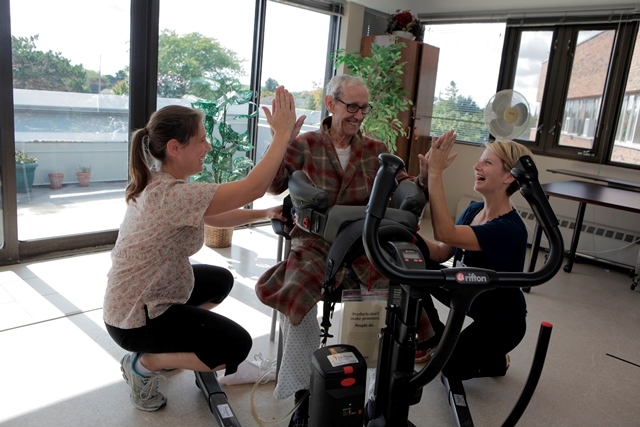It started with a fall. That’s how 80-year-old ‘Sandy Pine’ found herself in the Emergency Room at Campbellford Memorial Hospital.
Sandy is one of a growing number of seniors treated at the Emergency Room of Campbellford Memorial Hospital (CMH), a 34 bed hospital that serves Northumberland, Peterborough and Hastings County residents, largely a rural community with a population of approximately 30,000 people plus seasonal visitors who come to stay at their cottage.
Patients like Sandy present a particular challenge for the team at CMH. Sandy, who lives in a remote area, fell on the ice and was admitted to CMH with a fractured hip. Unable to move for four weeks, she was intent on returning to her home once she was mobile again. Hospital staff however were faced with a dilemma around her discharge and return home. Sandy lived alone in poor housing conditions with no family or community support in a very remote area. She did not have a family physician and she had previously refused the services of Community Care.
CMH is increasingly supporting patients like Sandy. This kind of situation presents a real challenge both ethically and in terms of resources for CMH. It is a challenge anticipated to grow into the future especially with the growing number of seniors moving into the area.
In Northumberland County, between 2006 and 2012, the age-group with the greatest percentage increase in population was the 85+ age-group (a 27.9% increase). By 2034, the population aged 65 and up is projected to increase by 94 per cent, including a more than doubling of the number of resident’s aged 85 years and up, compared to 2012 estimates. Canadians are living longer and in good health but the risk of developing a chronic condition increases with age, especially for individuals aged 80+.
For CMH this means we are treating more patients with higher acuity living with multiple chronic diseases and requiring acute services as part of their overall healthcare plan. Many lack family and community support and the impetus to access healthcare before a health problem becomes a life-threatening issue.
Our vision is to be a recognized leader in rural healthcare, creating a healthy community through service excellence, effective partnerships and the development of innovative hospital partnerships. CMH’s receipt of a 2013 Platinum Quality Healthcare Workplace Award from the Ontario Hospital Association shows the level of commitment we share in bringing this vision to life.
We are demonstrating this leadership and our award-winning team is making a difference with our concerted effort to provide senior friendly care. Our aim is to enable seniors to maintain optimal health while they are hospitalized so they can return home or transition to the next level of care that best meets their needs.
For example, we use a senior friendly approach to assess and care for seniors while fostering excellence. Treatment includes helping patients like Sandy optimize physical function. This includes:
- Restorative Care where a multidisciplinary team works closely with patients, assisting them to reach their highest level of ability to support their return home;
- Use of a Frailty Assessment for Care-Planning Tool daily on each patient at interdisciplinary rounds as a change indicator.
- Senior friendly walkabouts with patient experience advisors to review and change processes and our environment from an elderly patient point of view.
- Use of assessment tools like the Barthel Tool for functional decline to ensure elderly patients at risk of falling get the most appropriate care.
- A falls prevention program for people who are interested in getting information to help prevent a fall at home or in the community.
- Palliative and Therapeutic Harmonization (PATH) approach to care for assessing frail, older adults who visit the ER and are admitted for treatment. This gives patients and their family’s time and space to make complex healthcare decisions that project their best interests and quality of life.

Our focus on senior friendly care extends beyond the walls of the hospital and out into the community with a variety of health service providers. Our patients now have access to a local Geriatric Assessment and Intervention Network (GAIN) team. GAIN teams provide specialized care to support frail older adults living at home, including retirement residences with multiple complex medical problems including cognitive impairment, decreased function, falls or risk of falls, impaired mobility, incontinence and/or multiple medications. Frail older adults experiencing changes in support needs, safety concerns, psychological and mental health concerns or frequent health service usage benefit from the use of these services.
Ultimately, Campbellford Memorial Hospital is well-positioned to serve as a rural hub that brings together a variety of health service providers to support the needs of the aging population that defines our community. While much of our effort is focused on patients receiving acute care, we are working collaboratively with a growing network of health service and community service providers to create a wrap-around web of support for our growing senior community.
Most recently, our Board of Directors hosted a day of discussion around senior friendly care that brought together members from across our Region with a shared interest in achieving the best possible patient outcomes for our older community members. This is important because it brings a variety of organizations together to find new and innovative approaches to providing care for our community. I was pleased with the outcome of the day because it supported our collaborative approach to care for our seniors.
I’m proud of our team because they truly make our hospital a great place to receive care. It’s this level of commitment that enables CMH to ensure that patients like Sandy get the care they need to return home with the supports in place to continue to live independently in the community




